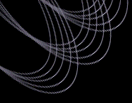|
|
 |
Value-Added Catalogs
Back to Data Products
- Second edition of the SDSS
Quasar Catalog As decribed in Schneider
et al. (2003, AJ 126, 2579),
this catalog contains 16,713 quasars from DR1 that have i-band
luminosities brighter than -22, at least one broad emission line, and
highly reliable redshifts. The catalog is now available in ASCII and
FITS binary table format.
- Composite red quasar spectra As described in Richards et
al. (2003), Red and Reddened Quasars in the SDSS, AJ, in
press, these spectra are composites as a function of relative
g-i color, with input objects normalized such that both the
absolute magnitude and redshift distributions are the same in like
composites. We provide this tarball of
composite red quasar spectra for download.
- Composite broad-absorption line (BAL) quasar spectra as a
function of BALQSO type from Reichard et al. 2003, A Catalog of
Broad Absorption Line Quasars from the Sloan Digital Sky Survey Early
Data Release, AJ,
125, 1711 (also astro-ph/0301019) and
Reichard et al. 2003, Continuum and Emission-Line Properties of
Broad Absorption Line Quasars, AJ, in press (astro-ph/0308508).
We provide this tarball of composite BAL quasar
spectra from the SDSS Early Data Relase; see the enclosed
README file for more information.
- SDSS Unusual BAL Quasars A sample of 23 unusual Broad
Absorption Line Quasars has been assembled from both the SDSS EDR and
some post-EDR data, totalling approximately 8000 quasar spectra. No
further examples of the five categories of unusual BAL quasars
discussed in the paper could be found among the data inspected, at
least for spectra with SNR at least 6 per pixel in at least one of the
g, r, or i bands (see section 4 of the paper). The paper also presents
a revised balnicity index for deciding whether a quasar is a BAL
quasar or not.
Calibrated SDSS and followup spectra of all 23 objects, plus
IRAF and SM code for calculating the traditional and revised balnicity
indices, are available in a gzipped tar file.
Questions regarding the BAL quasar work can be addressed to the lead
author, Pat Hall (pathall@astro.princeton.edu),
of Princeton University.
- DR1 White Dwarf catalog as reported by
Kleinman
et al. 2004, ApJ 607, 426 A Catalog of Spectroscopically
Identified White Dwarf Stars in the First Data Release of the
Sloan Digital Sky Survey (also available at astro-ph/0402209).
- Moving
Object Catalog (MOC) The Sloan Digital Sky
Survey Moving Object Catalog lists astrometric and photometric data
for 134,335 moving objects observed prior to March 11, 2003. The
catalog also includes orbital elements for 26,847 previously known
objects.
- SDSS Cut & Enhance
galaxy cluster catalog The Sloan Digital Sky
Survey CE galaxy cluster catalog (Goto
et al. 2002, AJ 123, 1807) uses color cuts
combined with a density enhancement algorithm to detect clusters
of galaxies. The SDSS CE galaxy cluster catalog contains an
estimated redshift and richness for each cluster found in 350
sq. deg. of SDSS commissioning data.
- NYU Value-Added
Galaxy Catalog The NYU Value-Added Galaxy Catalog (NYU-VAGC)
is a cross-matched collection of galaxy catalogs, including the
SDSS, maintained for the study of galaxy formation and evolution. It
includes carefully constructed large-scale structure samples useful
for calculating power spectra, etc, and includes, e.g., the "LSS
Sample12" described in various Blanton et al. and Tegmark
et al. SDSS papers. The SDSS data used have been reduced independently from the
official SDSS reductions included in DR2, especially in photometric
calibration, but the differences are minor. There is also a
page describing the results of Blanton et al.'s
determination of the SDSS galaxy luminosity function.
- Eigenspectra
of 170,000 SDSS galaxies As described in Yip et al. (2004, AJ
in press, also astro-ph/0407061),
this set of eigenspectra (Connolly
et al. 1995 AJ, 110, 1071) serves in the spectral
classification of galaxy and in the compression of the
massive information within the sample, among other applications. The
rest-wavelength coverage is from 3450 to 8350 angstrom. We provide
this tarball of eigenspectra and mean spectra for
download, containing both ASCII tables and GIF/ps plots of the spectra.
- The Princeton spectra
are an alternate reduction of the DR1 spectra. The 2d reductions
are essentially identical, but the determination of redshifts
and classifications uses an independent code doing direct
chi-squared fitting of templates to spectra.
- The SuperCOSMOS
Science Archive holds the object catalog data extracted
from scans of photographic Schmidt survey plates of the southern
sky. The SSA catalog includes links to cross-identifications
from the SDSS EDR and DR1, USNO-B and 2MASS final data release
catalogs.
Last modified: Fri Jul 9 17:26:46 CDT 2004
|
 |
 |


